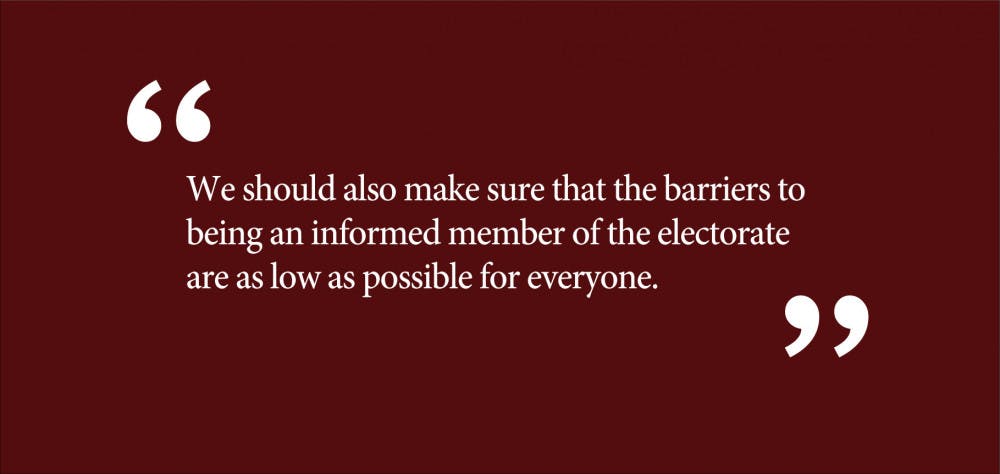Compared to other countries, voter turnout in the United States is dismal. Of all age groups in this country, millenials are the worst at showing up to vote. Clearly voting isn’t the only kind of civic engagement available to us, but it’s one option among many that is important to participate in. But bombarding people with reminders to vote isn’t enough to increase turnout — we should also make sure that the barriers to being an informed member of the electorate are as low as possible for everyone.
When I was filling out my absentee ballot this weekend, I didn’t recognize either of the names under the sheriff’s race, so I took to the internet and googled both names. The first few results were news articles about the race from a local paper’s website, but when I clicked to read, the information was locked behind a paywall.
Free, widely accessible candidate information is especially important in races that are non-partisan, and it’s impossible to know what a candidate’s ideological bent might be without doing your research. Perhaps state and local government websites could ask each candidate to fill out a standardized questionnaire, and then make the results public. (This is what the Minnesota State Bar Association does — for each contested judicial race, candidates reply to a questionnaire and then the Association posts the results on their website.) But this still seems insufficient to me: It’s easy for a candidate to make themselves look good when they’re filling out a survey about themselves. It’s not enough to just take what candidates say at face value. We need people fact-checking and evaluating election claims and faithfully presenting them to the electorate.
Margins at local newspapers are narrow —I get that — but it seems unlikely to me that newspapers would lose out in any meaningful capacity by making candidate profiles free to access for everyone. Providing people the information they need to choose the candidate that most closely aligns with their values is vitally important. It’s the job of the press to make this information easy to access, not just for those who can afford a subscription.
I admire the Guardian’s approach — they’re a journalism organization that has chosen not to hide their work behind a paywall. Instead, they ask readers to make either a recurring or one-time donation if they are able. Their strategy points out something important — reporting isn’t free to do, so if you value the work the Guardian does, you ought to contribute to their coffers. It’s also the job of those who can afford it to chip in, since this helps keep information accessible for all. Independent journalism is a valuable, powerful source for information, but it’s useless if would-be readers can’t access it.
Local newspapers have a unique role to play in informing communities about who’s on the ballot. Finding information about high-profile U.S. House or Senate races is much easier than learning about the ins and outs of your State Auditor or Secretary of State race. But it’s important to be informed about each race on your ballot — even the ones that seem small in comparison to congressional positions. Sheriffs set local law enforcement priorities, while state Supreme Court judges and Appeals Court judges shape how the law is administered and auditors make sure the state’s books are being run honestly. If information about these state-level races isn’t easy to find, voters are much less likely to make informed choices. I’m a reliable voter, even in off-year elections, but I find the process of researching candidates cumbersome, especially when I have a pile of homework to attend to.
Obviously, the responsibility of being an informed voter doesn’t just lie with newspapers and other sources of information — it also lies with you. Please do your homework about the candidates that are running for office. Please vote. If you already have done both of those things, bother your friends to do them too. And don’t just vote this time — local election turnout in off years is even worse than turnout in midterm elections. The choices that you make can help shape what your community looks like this year and in the years to come. (Personally, the school board elections are my favorite.)
Ruth Foster ’19 voted “Yes” on the school district operating levy increase and can be reached at ruth_foster@brown.edu. Please send responses to this opinion to letters@browndailyherald.com and other op-eds to opinions@browndailyherald.com.





